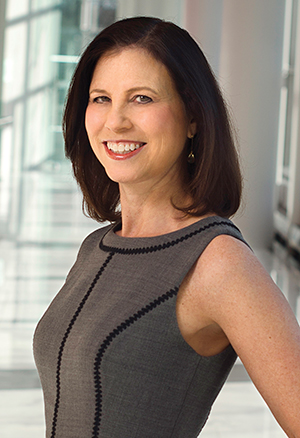American View
Personality
Joanne Lipman

When she was 7, Joanne Lipman read the book Harriet the Spy and immediately began carrying around a notebook, observing and asking questions of those around her. It’s no surprise that she became a journalist, working her way up from reporter to deputy managing editor of The Wall Street Journal and editor in chief of Portfolio. Most recently, she served as editor in chief of USA Today and chief content officer of its parent company, Gannett.
Three years ago, the New Jersey native, 57, began researching gender inequality in the workplace and strategies to fix it. The result is her best-selling book That’s What She Said: What Men Need to Know (and Women Need to Tell Them) About Working Together. She and her husband, Thomas Distler, are proud parents of Rebecca, 27, and Andrew, 25. This interview has been edited for brevity and clarity.
What was your motivation in writing That’s What She Said?
I came up in a very male-dominated industry, for the first 22 years at The Wall Street Journal. When I’d get together with other female professionals in my industry and others, the conversations were always the same: We were being marginalized, overlooked, interrupted, not getting credit for our ideas, not given the same respect as the men next to us. It was a good conversation to have, but only half the conversation. The only way to close the gender gap is to bring men into the conversation.
What are some of the key points you make?
Women are interrupted three times more frequently than men—even on the Supreme Court. One piece of advice I give is to interrupt the interrupters, or create a no-interruption rule. Amplification—having someone repeat what you say—ensures your idea gets heard. Get a friend at work to brag about your accomplishments to your boss, and you can do the same for her.
When women have children, they often dial back, get mommy tracked or leave the work force. Then when the kids are in high school and they want to work, these ambitious, educated, talented women are invisible to employers. Or a great opportunity might come up that involves travel or relocation, and men will cross a woman off the list because she has little kids. Ask her. Let her make the decision.
In the age of #MeToo, what was the worst experience you had in journalism?
When I was 22, I went to a businessman’s office for an interview. He locked the door and stripped to his underwear. It was terrifying. I interviewed him in his underwear and got the hell out of there. My editor laughed when I told him. He was impressed I didn’t get rattled. Today’s response would be different: Call the police.
Do older women bear a responsibility for not coming out sooner on these issues?
100 percent. Women of my generation were just trying to fit in to the business world, a male world. We weren’t trying to change it. We just wanted to be part of it. In the 1980s, women thought the battles were won by the women who came before us. We thought we were on equal
footing. We thought it was solved. We were wrong.
Have you seen any demonstrable differences in the past year as a result of #MeToo?
I’ve seen a lot of talking but not a lot of action. And it’s not all about sexual harassment. Not every woman has been assaulted at work but every woman knows what it’s like to be marginalized and not respected, and it’s those issues that lead a woman to leave a workplace.
How would you describe your connection to Judaism?
I went to Hebrew school, had my bat mitzvah and continued classes a few years after in my Conservative synagogue. My husband is Jewish but was raised without religious education. It was very important to me to be married in a religious ceremony and that our kids had bar and bat mitzvahs. I’m not a regular synagogue-goer but my family does observe the Jewish holidays and rituals.
Gerri Miller is an entertainment and lifestyle journalist who contributes to the Jewish Journal in Los Angeles and numerous other publications.











 Facebook
Facebook Instagram
Instagram Twitter
Twitter
Leave a Reply